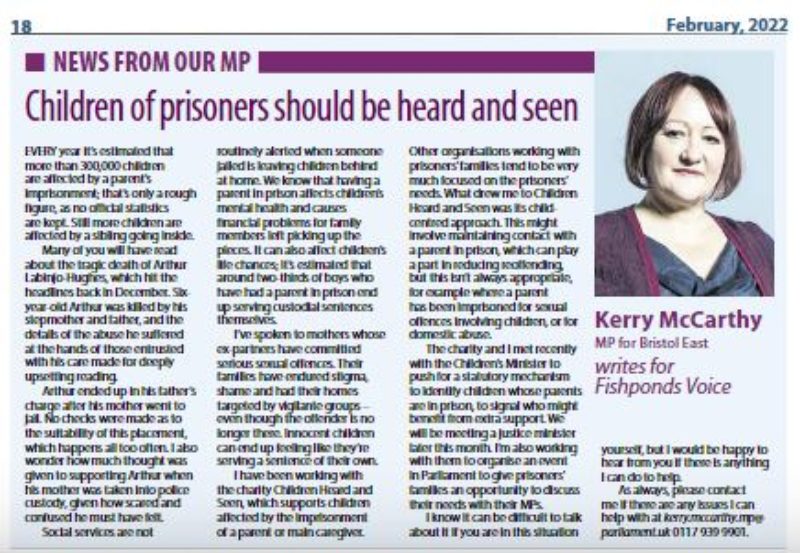Kerry McCarthy Labour MP for Bristol East

Bristol East MP Kerry McCarthy writes for the Fishponds Voice, February 2022.
EVERY year it’s estimated that more than 300,000 children are affected by a parent’s imprisonment; that’s only a rough figure, as no official statistics are kept. Still more children are affected by a sibling going inside.
Many of you will have read about the tragic death of Arthur Labinjo-Hughes, which hit the headlines back in December. Six-year-old Arthur was killed by his stepmother and father, and the details of the abuse he suffered at the hands of those entrusted with his care made for deeply upsetting reading.
Arthur ended up in his father’s charge after his mother went to jail. No checks were made as to the suitability of this placement, which happens all too often. I also wonder how much thought was given to supporting Arthur when his mother was taken into police custody, given how scared and confused he must have felt.
Social services are not routinely alerted when someone jailed is leaving children behind at home. We know that having a parent in prison affects children’s mental health and causes financial problems for family members left picking up the pieces. It can also affect children’s life chances; it’s estimated that around two-thirds of boys who have had a parent in prison end up serving custodial sentences themselves.
I’ve spoken to mothers whose ex-partners have committed serious sexual offences. Their families have endured stigma, shame and had their homes targeted by vigilante groups – even though the offender is no longer there. Innocent children can end up feeling like they’re serving a sentence of their own.
I have been working with the charity Children Heard and Seen, which supports children affected by the imprisonment of a parent or main caregiver. Other organisations working with prisoners’ families tend to be very much focused on the prisoners’ needs. What drew me to Children Heard and Seen was its child-centred approach. This might involve maintaining contact with a parent in prison, which can play a part in reducing reoffending, but this isn’t always appropriate, for example where a parent has been imprisoned for sexual offences involving children, or for domestic abuse.
The charity and I met recently with the Children’s Minister to push for a statutory mechanism to identify children whose parents are in prison, to signal who might benefit from extra support. We will be meeting a justice minister later this month. I’m also working with them to organise an event in Parliament to give prisoners’ families an opportunity to discuss their needs with their MPs.
I know it can be difficult to talk about it if you are in this situation yourself, but I would be happy to hear from you if there is anything I can do to help.
